NEW MG KIDS VIDEO! Let’s talk about all that butter and shortening in the holiday cookies. But instead of calories, let’s talk science!
Fellowships explore the Future of Energy
The three largest industries in our region are healthcare, advanced manufacturing and energy. A number of our fellowships deal with energy and I have spent the last year reading as many resources as I could get my hands on. The issues are complex, we have much to consider as we make the transition, but the primary message is “Political dynamics will change when the world transitions to electric power generated primarily through wind and solar. ”
Rare Earth Elements
Every country has access to wind and sun. However, you still need to mine the minerals and metals needed to make the solar panels, wind turbines, and batteries. These minerals are not distributed evenly. All of our high tech electronics are made of what are called rare earth elements. These are things like neodymium (Nd), cerium (Ce), dysprosium (Dy), erbium (Er), (my favorite!) promethium (Pm), and about a dozen others that have a variety of very important industrial uses. Fortunately, they’re not as rare as their name implies, but they’re also not geographically distributed evenly. China happens to have the good fortune to end up with about 3/4 of the world’s deposits of these powerful elements, which puts it in a strong trade position in the future. Countries who are developing technology for wind and solar will also be in a strong position. That knowledge should affect our educational goals.
While they are just at the beginning of their research, our Rare Earth Elements Fellowship team will be bringing you news and great information on these elements.

Small Modular Reactors in Future Cities
The Baden Academy Future City Competition Team used Small Modular Reactors (SMRs) in their Future City design for a more resilient energy future. SMRs can fit on the back of a trailer truck, provide energy for a small city/industrial center and offer distinct safeguards, security and nonproliferation advantages. The team was able to visit Westinghouse and hear a brief presentation on their eVinci Micro Reactor. Their tradition will continue with this year’s team.
A Digital Tour of a Nuclear Plant
We wanted to start students even younger thinking about nuclear power. This year we started a new project to archive our history and demonstrate basic nuclear science concepts. A team of students is making a Minecraft model of the Shippensport Nuclear Plant, the world’s first full-scale atomic electric power plant. I’ll keep you up to date on the progress and future plans!

Baden Academy Teachers investing in Energy Resources
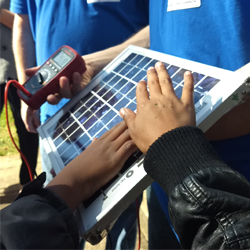
Fourth grade teachers at Baden Academy have used solar cars to teach the engineering design process. Recently, solar energy educators came to the school with panels and solar power testing equipment. Teachers continue to use the material as the students learn more about this form of energy.
Fifth grade Baden Academy teacher and Houston Solution research fellow Melanie Houston has been receiving curriculum support from The NEED Project.
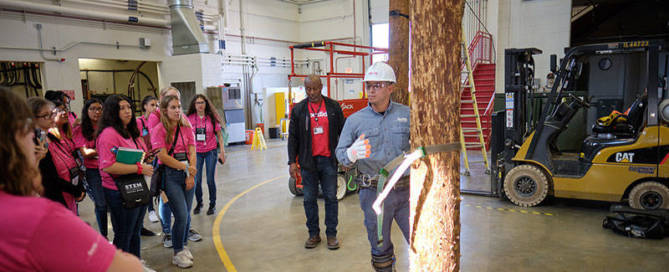
Reading List
These are the resources I felt most useful!
The Grid: The Fraying Wires Between Americans and Our Energy Future Gretchen Bakke (Author)
The Science of Energy: Resources and Power Explained Audible Audiobook – Original recording Michael E. Wysession (Narrator, Author)
Energy and Civilization: A History Audible Audiobook – Unabridged Vaclav Smil (Author),
Organized Kids at NAPO

On Thursday, October 10, three 6th grade girls traveled to the Crown Plaza Suites to attend the NAPO (National Association of Productivity and Organizing Professionals) Pittsburgh’s 3rd Annual Organizing Seminar“Release & Renew” Organizing Tips and Tricks from the Pros.
Sofia, Hamari, and Destiney were able to present some of their research and the resource posters they have created, inviting participants to visit their website, organizedkids.weebly.com, to watch some of their videos.

The girls received a standing ovation. They were humbled by the enthusiastic embrace of so many professionals. They came back from the day all a buzz about what they learned, the tools they discovered, and the people they met.
One of the other professional organizers marveled that a school would embrace a program like this, knowing how learning organizational skills are crucial for healthy human flourishing, yet rarely taught.
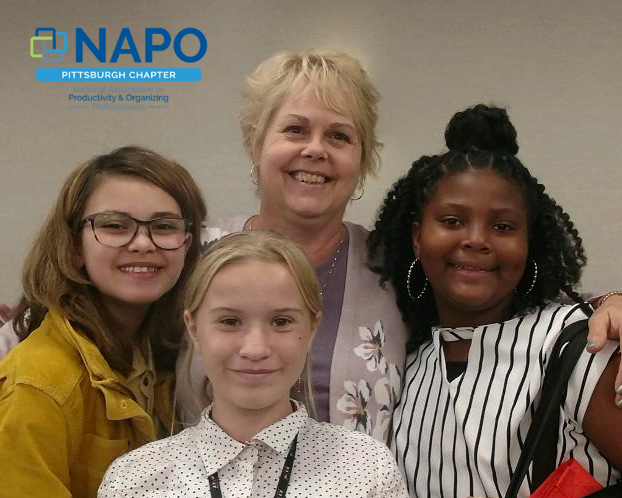
The Organized Kids would not have flourished without the expert guidance and support of their mentor, Dorothy Clear. Dorothy generously sets aside two or three days a month to stop in the classroom and work directly with the girls as they set their goals for the year and work hard to achieve them. https://www.clearorganization.biz/

Their plans this year include the Hamari’s one on one consultation and weekly intervention with a 2nd-grade ‘client’ who struggles with organization and the classroom tour of “The Pipe Cleaner Pencil.” Evidently, lost pencils are a constant source of stress and drama in the classroom. The Organized Kids (one of the Baden Academy Research Fellowship Programs) are visiting select classrooms with glue guns and pipe cleaners to help make wearable unique pencils that students can hold onto that express their individual artistic creativity. Follow-through will be the mathematics of analyzing if this organizational intervention was truly effective.
I encourage you to visit their website, like their videos, buy their posters, and send a comment to these amazing young girls and their mentor.

Announcing the 2019-20 Research Fellows and Their Projects
The Fellows have been very busy in the lab working on their branding slides! Check out what they have accomplished already and stay tuned for many more updates from these amazing kids!
Amazing Fellows at the Harvest Festival
Thank you to all who came out on Saturday to celebrate the fellows at their table at the Baden Academy Harvest Festival!
https://platform.twitter.com/widgets.jsCome meet author Alyssa and see our book Engineering Wings to Sun at the Baden Academy Harvest Festival pic.twitter.com/vQqoWLdpN6
— Media Lab (@DrEllenMediaLab) September 28, 2019
https://platform.twitter.com/widgets.jsEthan and Maddie are ready to demonstrate the Need Battalion Piper Kits at the Baden Academy Harvest Festival pic.twitter.com/itSKVmCsul
— Media Lab (@DrEllenMediaLab) September 28, 2019
https://platform.twitter.com/widgets.jsDon't miss programming with Dragon Tag leader Noah Steffler at the Baden Academy Harvest Festival pic.twitter.com/HGQVBANrZi
— Media Lab (@DrEllenMediaLab) September 28, 2019
https://platform.twitter.com/widgets.jsClayton is on hand at the Baden Academy Harvest Festival with his new book about alcohol addiction. pic.twitter.com/utrlpgb97j
— Media Lab (@DrEllenMediaLab) September 28, 2019
https://platform.twitter.com/widgets.jsFruit Spaghetti by the MG Kids at the Baden Academy Harvest Festival pic.twitter.com/nnuD1ukse2
— Media Lab (@DrEllenMediaLab) September 28, 2019
Come to the Beaver BookFest Sat. Sept. 7!
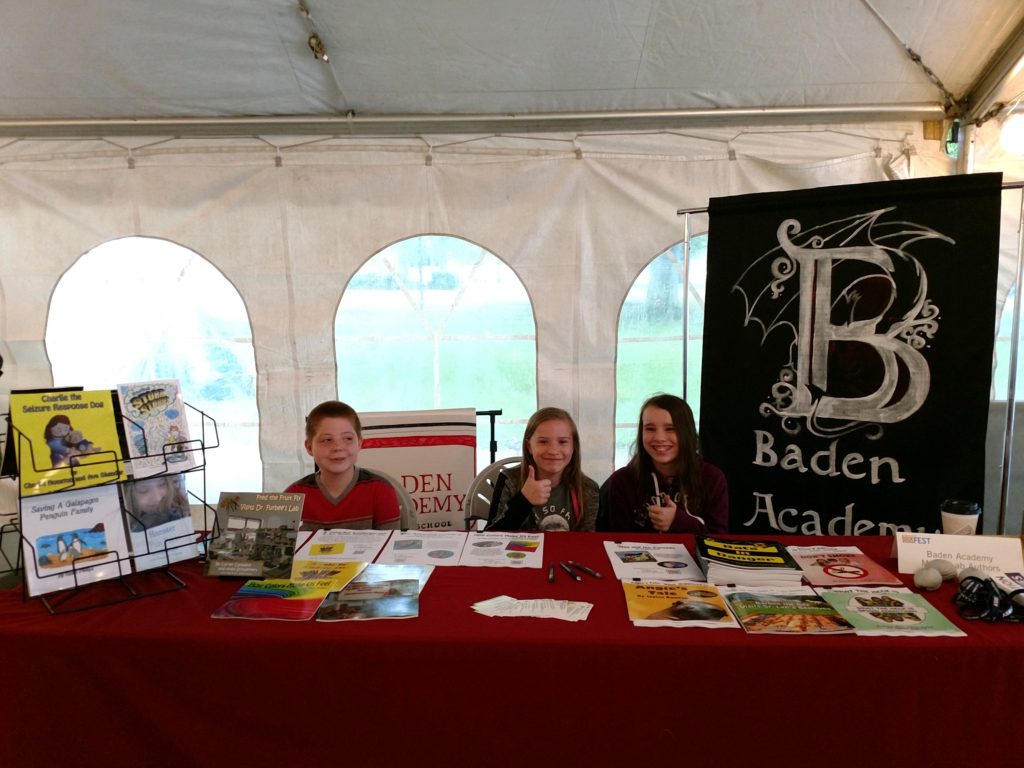
Come meet some of the authors from Baden Academy at the Beaver County BookFest 2019 taking place Saturday, September 7th from 9 a.m. to 4 p.m., in the charming and historic town of Beaver, PA.
The Main Event on Saturday is free and features our main Authors’ Tent (with 60+ authors!), our popular Children’s Tent with plenty of activities for the little ones, music on the street, and of course, a variety of food and retail vendors.
Come meet local authors and get your books autographed. We can’t wait to see you in September!
Baden Academy authors wrote 5 new books this year, including one with the Beaver County Historical Society and 5 area geologist, another with scientists from Tel Aviv studying bats and RFID, a third celebrating ceramics partnered with Swindell Dressler and Harbison Walker, another book by the Kids vs. Addiction team with addiction specialists from the ASAM, and Mrs. Keriotis’s kindergarten class again produced a masterpiece of Van Gogh, hedgehogs and smiling kids.
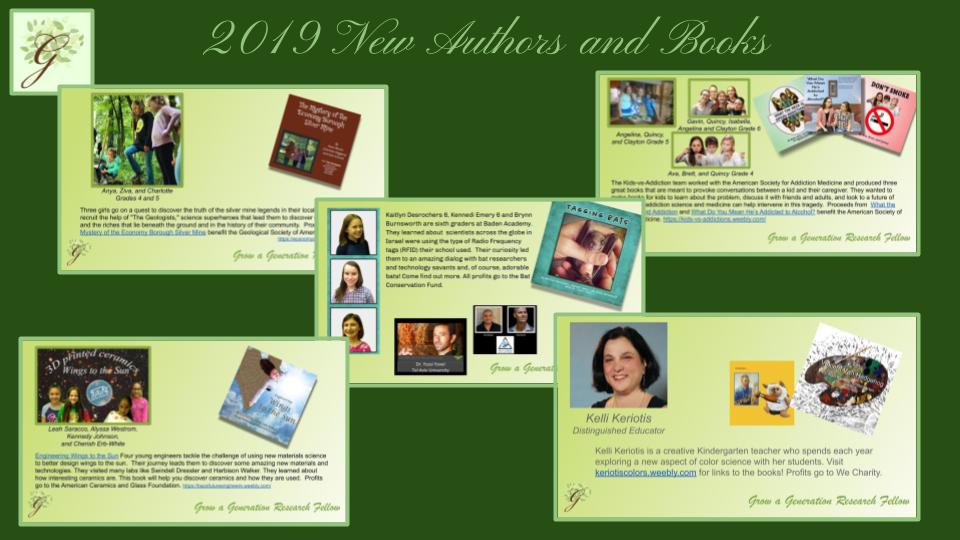
New Fellowship Applications are Due September 4.
Fellowships applications are being passed out this week. They are due September 4
WHAT IS A RESEARCH FELLOWSHIP?
Fellowships are year-long projects (meeting about 60 minutes a week during two different I/E (Intervention and Enrichment) periods during the school day). Fellowship projects enable a student, group of students, teacher or classroom to write a book, create a website or game, or learn leadership skills as leaders of an afterschool STEM Club.
Fellows are celebrated around the world (and locally at a STEM Family Night at the end of the year) with their YouTube videos, books, and games. Students work alongside mentors and project managers to complete all the steps in designing and producing their projects. We keep kids engaged as learners and provide them with a sense of mastery, autonomy, and purpose. Projects are portfolio worthy to include in applications to schools, scholarships, or internships. Students have mentioned that the world seems so much bigger to them after they experience a fellowship.
You are invited to help your child apply to become one of these Research Fellows and work to become a STEM Athlete, Digital Storyteller, and World Changer. We can help you pick a topic. Fellows choose from diverse fields of study which pique their imaginations and resonate with their unique talents and individual passions. Their real-world project suggestions must make valuable contributions to the community that will be shared and disseminated with published materials, digital artifacts, competition entries, and teaching opportunities. A discussion with a fellowship project manager allows you a chance to partner your child’s interests with real-world scientists, charitable organizations, and successful entrepreneurs looking to support students pursuing STEM.
Once accepted into the program, research fellows engage in projects that instill and strengthen a 21st-Century skill set of innovation, critical thinking, collaboration, emotional intelligence, resilience, leadership, and vision. They will meet weekly in small groups in the Baden Academy Innovation Lab for discovery and collaboration. These meetings will take place during Intervention and Enrichment times during the school day. An annual STEM Family Night marks the celebration of accomplished goals and a time to pause, evaluate and redesign goals for the future.
Watch the playlist of last years fellows to get an idea of some of the opportunities others have created.
The application form can be DOWNLOADED or sent home with your child.
Questions can be directed to Dr. Ellen in the Media Lab.
The Baden Academy Chess Club
The current leaders of our Chess Club received the position by applying to the research fellowship program. They are responsible for designing the flyer and online sign up forms at the beginning of the year, speaking personally to past members with an invitation, promoting their club in classrooms, designing lesson plans that include attendance, sharing news of chess in technology, leading the after-school group through end game scenarios, promoting and celebrating participation in area tournaments and reflecting on their roles as leaders. They also manage the clubs website and design the t-shirt club members can order from the product catalog on their website.
I must admit, I was a bit hesitant to include an afterschool chess club in the middle of Science, Technology, Engineering and Math programs. I was quickly swayed. The connections to mathematics are evident (and the content of some fascinating Numberphile episodes and science fairs). Even learning about programming a computer to beat chess masters is a journey into the history and future of STEM.
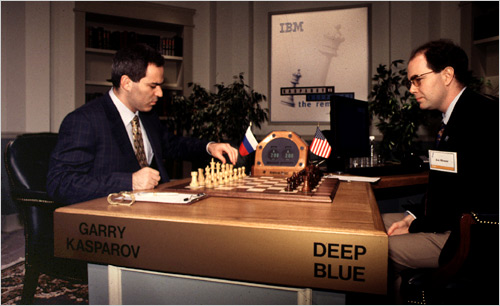
The kids are encouraged to practice on their own with chess.com. That program uses brute force to beat humans. It calculates the millions of moves that 32 pieces on an 8-by-8 board can make and run every possibility of a problem until the program finds the best solution. This was the method of the computer Deep Blue, the IBM supercomputer used to beat Garry Kasparov, the Russian Chess Grandmaster, in 1997. (I am not the only one who names their computers!)
This year we were able to learn about artificial intelligence, the training of a computer to teach itself. Google’s AlphaZero AI computer soundly defeated Stockfish, the world’s best brute force chess program. The difference between the two machines: AlphaZero taught itself how to play like a human.
Lessons of chess, we learned, go far beyond mathematics, far beyond technology, they even teach us about the testing and evaluation of intelligence. Malcolm Gladwell, the New Yorker author, often visits the topic of chess to uncover some new insight into the human condition. His most recent podcast, Puzzle Rush compared the “finish quickly” measure of intelligence to the “take your time” measure of intelligence. The “finish quickly” includes standardized tests like the LSATs, most classroom tests, and playing chess in a program called Puzzle Rush (on online blitz chess program allowing only 5 minutes for the whole game). The “take your time” measure of intelligence that is a take-home test or the way a classical chess tournament. There is still a time limit, but there is time for calculation, working through possible scenarios, time to prioritize and organize your thoughts. I encourage you to listen! It seems the two different types of measures allow different individuals to rise to the top.
[Side note to parents: If you are traveling this summer, short or long distances, consider playing podcasts like Revisionist History or Science Friday in the car, pausing often to discuss with the kids. Podcasts are a great way to feed their brains all summer long!]
Mr. Jake, our Baden Academy chess coach, (and Mr. Wolf, his predecessor and founder of a chess culture at the school), have pointed out to me that many of the kids who are successful in chess are kids not traditionally held up as the smartest in PSSA standardized tests and benchmarks. Classical chess allows for a different type of intelligence to rise to the top. Our leaders have grown in their awareness of how fragile the self-concepts of “smart” and “intelligent” are in their club members and in themselves.
Our fellowships open up the possibility of cultivating early important lessons in leadership, lessons of collaboration, of managing diverse groups of people, of risking failure, and of having the vision to create a worthy legacy.
Four teachers named Distinguished Educators at Baden Academy
Four teachers at Baden Academy Charter School have been named 2019 Grow a Generation Distinguished Educators. Each volunteered to work hard in a year-long fellowship project that helped hone their craft of teaching. Each project expanded knowledge of content and pedagogy, exemplified and involved the students in their own learning, empowered students to act in new ways, and sought out other education professionals working on similar problems.
MELANIE HOUSTON, GRADE 5 MATH AND SCIENCE TEACHER
Melanie Houston project inspired fearless scientific explorers with a Space Shuttle Tile. The Houston Solution presented students with problems encountered in the vast expanse of space, the beginnings of knowledge to solve them, and the inspiration from successfully space themed STEM projects.
KENISHA PAGE, GRADE 2 TEACHER
Kenisha Page celebrated Beaver County underground railroad sites and stories which served thousands of escaping slaves. The Beaver County Black History project leads students of Beaver County to discover the rich history of our community’s active fight against racial inequality, particularly our role in the Underground Railroad.
KASSANDRA SMITH, MUSIC TEACHER
Kassandra Smith burst through barricades in her lip sync directorial debut. Her project required her to storyboard, choreograph, develop a shooting schedule for, operate cameras, shoot footage, supervise editorial processes and produce a lip sync video involving every member of the school community. The project’s purpose was to explore how film can add dimension, analyses of expressive, the ability to explain particular elements of music within the song selection, and motivation to improve performance.
All of these wonderful teachers went above and beyond what was simply required in the classroom, above and beyond honing their craft as teachers. They rose to the heights of demonstrating their love for learning by fearlessly demonstrating to their students their commitment to life long learning, their willingness to risk mistakes, and their high expectations that what is happening is important and it is essential to get it right.
Baden Academy Class 2018 – This Is Me
This Fellowship project of our music teacher Mrs. Kassandra Smith of Baden Academy Charter School celebrates the entire school singing the iconic song “This Is Me” from “The Greatest Showman”. Special thanks to Summer Hartman for all the work she did to help edit the video.

